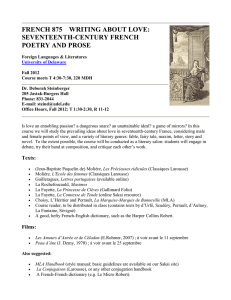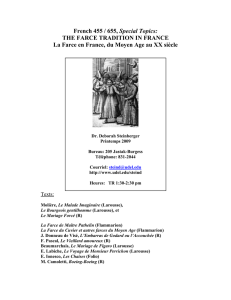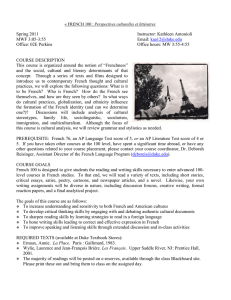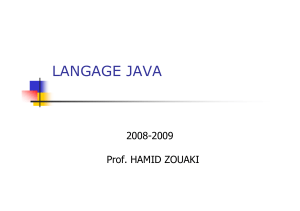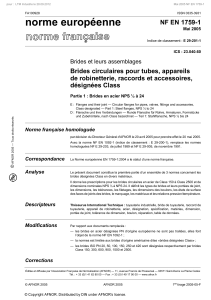FRENCH 438/638 WRITING ABOUT LOVE: SEVENTEENTH-CENTURY FRENCH
advertisement
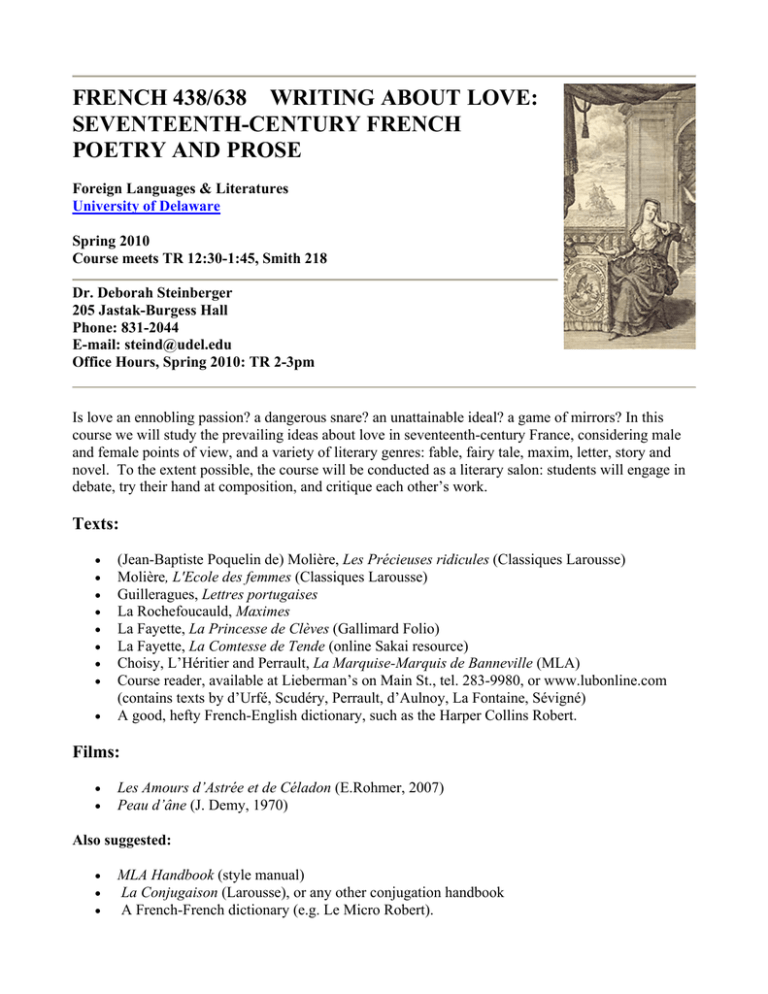
FRENCH 438/638 WRITING ABOUT LOVE: SEVENTEENTH-CENTURY FRENCH POETRY AND PROSE Foreign Languages & Literatures University of Delaware Spring 2010 Course meets TR 12:30-1:45, Smith 218 Dr. Deborah Steinberger 205 Jastak-Burgess Hall Phone: 831-2044 E-mail: steind@udel.edu Office Hours, Spring 2010: TR 2-3pm Is love an ennobling passion? a dangerous snare? an unattainable ideal? a game of mirrors? In this course we will study the prevailing ideas about love in seventeenth-century France, considering male and female points of view, and a variety of literary genres: fable, fairy tale, maxim, letter, story and novel. To the extent possible, the course will be conducted as a literary salon: students will engage in debate, try their hand at composition, and critique each other’s work. Texts: • • • • • • • • • (Jean-Baptiste Poquelin de) Molière, Les Précieuses ridicules (Classiques Larousse) Molière, L'Ecole des femmes (Classiques Larousse) Guilleragues, Lettres portugaises La Rochefoucauld, Maximes La Fayette, La Princesse de Clèves (Gallimard Folio) La Fayette, La Comtesse de Tende (online Sakai resource) Choisy, L’Héritier and Perrault, La Marquise-Marquis de Banneville (MLA) Course reader, available at Lieberman’s on Main St., tel. 283-9980, or www.lubonline.com (contains texts by d’Urfé, Scudéry, Perrault, d’Aulnoy, La Fontaine, Sévigné) A good, hefty French-English dictionary, such as the Harper Collins Robert. Films: • • Les Amours d’Astrée et de Céladon (E.Rohmer, 2007) Peau d’âne (J. Demy, 1970) Also suggested: • • • MLA Handbook (style manual) La Conjugaison (Larousse), or any other conjugation handbook A French-French dictionary (e.g. Le Micro Robert). Requirements and course policies: • • • • • • Since French 438/638 is a discussion class, regular attendance, thorough preparation and active participation are essential. Please arrive on time and expect to stay until the end of class; please avoid scheduling job interviews or medical appointments during class time. If the number of unexcused absences exceeds three, the student's final participation grade will be lowered ten points for each absence. Please note that this unexcused absence policy is a safeguard in case of emergency, and NOT an invitation to “take days off” from class. Students who know they must be absent on a given day should be sure to give the instructor advance notice. Furthermore, students who have missed class are responsible for checking Sakai for the day’s homework, and for contacting a classmate to find out what was covered. All written assignments must be turned in at the start of class on the day they are due, and online assignments must be completed by the specified deadline. NEVER SKIP CLASS or come late just because an assignment is not ready!! If you are having exceptional difficulties completing a paper (computer problems, insufficient time to proofread, etc.) you must notify me of this in class to make arrangements for submission of the late work. Please note that I do not accept papers sent as e-mail attachments. Since e-mail will be used for course announcements, all students are required to activate their university e-mail accounts if they have not already done so, and to check their mail regularly. Written work for the course must be word-processed, double-spaced, computer spellchecked at the Foreign Language Media Center and thoroughly proofread (do not depend solely on grammar checkers—they are often unreliable--or even on the required spell-checker). Programs with French accents and French spell-checkers are available at the Foreign Language Media Center, in the basement of Jastak-Burgess Hall. The FLMC is open Monday through Friday from 8:45am-4:30pm. No credit will be given for work which has not been carefully proofread. VERY IMPORTANT: In accordance with University and departmental policy, academic dishonesty including plagiarism will result in an F for the course and a permanent stain on your academic record. In your writing, it is absolutely essential that you make it clear where your ideas end and those of another author begin. I have strict guidelines for peer-editing: please check with me before asking someone else to review or correct your work. When you write, the use of online translators for anything beyond an occasional word or two constitutes plagiarism and is strictly prohibited: use your dictionary. If you have any questions about documenting your sources, including online sources, please consult the MLA guidelines (available as a course resource link on our Sakai site, or at http://owl.english.purdue.edu/owl/resource/557/01/), and see me with any concerns about documentation. Composition de la note: 438 638 · · · · · · · 20% 15% 15% 15% 15% --20% 20% 15% 10% 15% 15% 5% 20% Participation, préparation (lectures, devoirs, discussion) Petits projets écrits individuels (carte, question d’amour, portrait, [proverbe]) Projet écrit en groupe (conte de fées ; 5 pp. environ) Explication de texte (4-5 pp. pour 438; 5-6 pp. pour 638) Présentation orale (10-15 min; groupe pour 438, individuelle pour 638) Bibliographie annotée Dissertation finale (6-8 pp. pour 438; 10-12 pp. pour 438) Dates importantes: • • • • jeudi 11 mars : Conte de fées (à rendre en classe) jeudi 25 mars : Explication de texte (à rendre en classe) jeudi 8 avril : Bibliographie annotée (638 uniquement) mardi 18 mai: Dissertation finale (à glisser sous la porte de mon bureau avant 16h) Programme d'études (à titre indicatif) • • • • • • • • • • • • • • • semaine du 9 février: Introduction au cours; d’Urfé, L'Astrée (extrait); la préciosité semaine du 16 février: Scudéry et la préciosité ; Molière, Les Précieuses ridicules semaine du 23 février: Molière, L'Ecole des femmes semaine du 2 mars : contes de fées de Perrault et de Mme d’Aulnoy semaine du 9 mars: contes de fées; Guilleragues, Lettres portugaises semaine du 16 mars: Lettres portugaises ; La Fontaine, Fables semaine du 23 mars: La Fontaine, Fables semaine du 30 mars: VACANCES DE PRINTEMPS semaine du 6 avril: La Rochefoucauld, Maximes semaine du 13 avril: La Rochefoucauld, Maximes; La Fayette, La Princesse de Clèves semaine du 20 avril: La Fayette, La Princesse de Clèves semaine du 27 avril : La Fayette, La Princesse de Clèves ; La Comtesse de Tende semaine du 4 mai: lettres de Mme de Sévigné; Choisy, L’Héritier et Perrault, La MarquiseMarquis semaine du 11 mai: Choisy, L’Héritier et Perrault, La Marquise-Marquis mardi 18 mai: Conclusion Pour tout renseignement complémentaire contacter Dr. Steinberger, tél. 831-2044, ou par e-mail: steind@udel.edu
